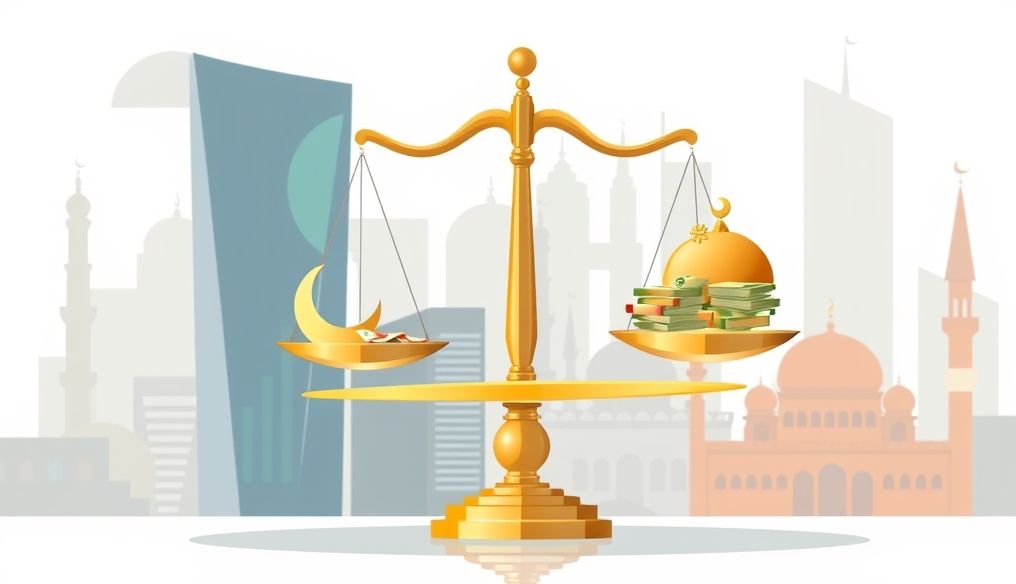Islamic Financial Planning: Your Path to Halal Wealth and a Prosperous Life
In an increasingly complex world of finance and investment, many are looking for ways to achieve their financial goals while adhering to their religious and ethical principles. This is where Islamic financial planning comes in, combining the best modern financial practices with the benevolent principles of Islamic Sharia.
What is Islamic Financial Planning?
Islamic financial planning is a comprehensive process of managing an individual's or family's financial resources, with the aim of achieving their financial goals while adhering to the provisions of Islamic Sharia. This includes identifying financial goals, assessing the current financial situation, developing a plan to achieve the goals, implementing the plan, and reviewing it regularly.
The Core Pillars of Islamic Financial Planning:
- Adherence to Sharia Principles: Avoiding Riba (interest), Gharar (excessive uncertainty), Maysir (gambling), and investing in prohibited activities.
- Balance Between This World and the Hereafter: Achieving financial well-being in this world while not neglecting preparation for the afterlife.
- Justice and Fairness: Dealing fairly with all parties, and avoiding injustice and deception.
- Zakat: Paying the obligatory Zakat on wealth that has reached the Nisab (minimum threshold).
- Social Solidarity: Contributing to supporting the needy and the community.
Chapter 1: Defining Islamic Financial Goals
The first step in Islamic financial planning is to clearly define financial goals. Goals should be Specific, Measurable, Achievable, Relevant, and Time-bound (SMART). Some examples of Islamic financial goals:
- Buying a halal home.
- Saving for marriage.
- Saving for children's education.
- Saving for retirement.
- Performing Hajj or Umrah pilgrimage.
- Donating to charitable causes.
Example: Instead of saying "I want to save money," set a more specific goal such as "I want to save $50,000 to buy a house within 5 years."
Chapter 2: Assessing Your Current Financial Situation
After setting financial goals, you need to assess your current financial situation. This includes gathering information about income, expenses, assets, and liabilities. A balance sheet and income statement can be used to assess the financial situation.
Assets: Include cash, investments, real estate, and other valuable properties.
Liabilities: Include debts, loans, and other obligations.
Example: Prepare a table showing all your monthly income sources (salary, extra income, etc.) and all your monthly expenses (rent, food, transportation, etc.). This will help you identify where your money is going and how you can reduce expenses and increase savings.
Chapter 3: Creating an Islamic Budget
A budget is a financial plan that outlines how money is spent. An Islamic budget should reflect Islamic priorities, such as Zakat and charitable donations.
Tips for Creating an Effective Islamic Budget:
- Identify your financial priorities.
- Track your expenses.
- Reduce unnecessary expenses.
- Allocate a portion of your income for Zakat and charitable donations.
- Review your budget regularly.
Chapter 4: Halal Investing
Halal investing is investing money in activities that comply with Islamic Sharia principles. There are many halal investment options available, including:
- Sukuk: These are Islamic debt instruments similar to traditional bonds, but compliant with Islamic Sharia.
- Islamic Stocks: These are shares of companies that operate in halal activities and do not deal with Riba, Gharar, or Maysir.
- Islamic Investment Funds: These are funds that invest in Sharia-compliant assets.
- Islamic Real Estate: These are investments in real estate that are financed according to Islamic Sharia principles.
- Gold and Silver: Gold and silver can be invested in as a safe asset and haven in times of economic crisis.
Example: Instead of investing in usurious banks, you can invest in an Islamic bank that offers Sharia-compliant products and services.
Chapter 5: Takaful Insurance
Takaful insurance is an Islamic insurance system based on cooperation and solidarity among participants. Takaful aims to protect participants from potential financial risks, while adhering to Islamic Sharia principles.
The Difference Between Takaful and Traditional Insurance:
- Takaful is based on the principle of cooperation and solidarity, while traditional insurance is based on the principle of risk transfer.
- Takaful does not involve Riba, Gharar, or Maysir, while traditional insurance may involve these elements.
- The surplus in Takaful is distributed to the participants, while the surplus in traditional insurance goes to the company.
Chapter 6: Zakat
Zakat is the third pillar of Islam, and it is an obligatory financial duty imposed on Muslims who own wealth that has reached the Nisab. Zakat must be paid on cash, gold and silver, stocks and bonds, rental properties, agricultural crops, and livestock.
How to Calculate Zakat:
The method of calculating Zakat varies depending on the type of wealth. In general, Zakat is calculated at a rate of 2.5% of the value of the wealth that has reached the Nisab and has been held for one lunar year.
Chapter 7: Managing Debt According to Islamic Sharia
Debt management is an important part of Islamic financial planning. Borrowing should be avoided except in cases of necessity, and when borrowing, Islamic Sharia principles must be adhered to.
Tips for Managing Debt According to Islamic Sharia:
- Avoid borrowing with Riba.
- Look for Islamic financing alternatives.
- Develop a plan to repay debts as quickly as possible.
- Avoid accumulating debt.
Chapter 8: Retirement Planning in Islam
Retirement planning is an important part of Islamic financial planning. You should start saving for retirement early and invest in Sharia-compliant assets.
Retirement Savings Options in Islam:
- Islamic pension funds.
- Investing in Islamic real estate.
- Investing in gold and silver.
- Saving in Islamic savings accounts.
Chapter 9: Education Planning in Islam
Education is one of the most important priorities in Islam. You should plan to provide a good education for your children and save to cover the costs of education.
Tips for Education Planning in Islam:
- Start saving early.
- Invest in Islamic education savings plans.
- Look for Islamic scholarships and educational loans.
Chapter 10: Periodic Review of the Islamic Financial Plan
The Islamic financial plan should be reviewed regularly and adjusted as needed. The financial plan should reflect changes in financial circumstances and financial goals.
When Should the Islamic Financial Plan be Reviewed?
- When there is a significant change in income or expenses.
- When there is a change in financial goals.
- When there is a change in economic conditions.
- At least once a year.
Conclusion: Islamic financial planning is a powerful tool for achieving financial goals while adhering to Islamic Sharia principles. By following the steps mentioned in this article, you can build a secure and prosperous financial future for yourself and your family.




